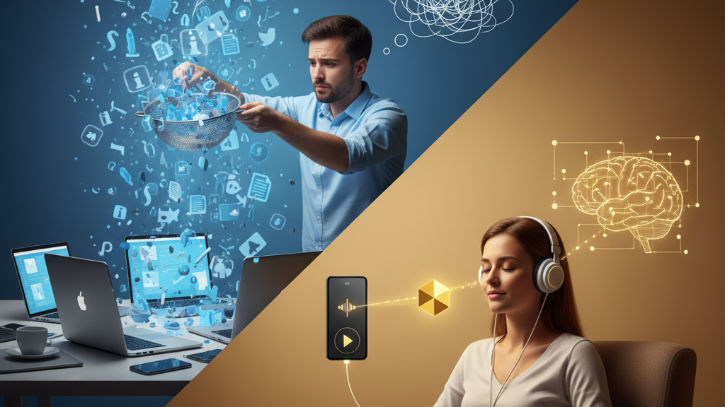The Science Behind 1-Minute Summaries: Why Less is Actually More
1/5/2025

I used to think I was great at multitasking. I’d have 20 browser tabs open, listen to a podcast while reading an article, and check my phone notifications every few minutes. I felt productive, like I was absorbing information from every direction. But here’s the uncomfortable truth: I wasn’t learning anything.
The average knowledge worker consumes 34 GB of information daily—that’s enough to crash a laptop from the 1990s. Yet studies show we retain less than 10% of what we read. I was drowning in information but starving for knowledge.
Why Your Brain Can’t Handle Information Overload
Here’s what I learned the hard way: your brain isn’t designed to process information the way we’re trying to use it. When I tried to read a 3,000-word article while listening to music and checking emails, my brain defaulted to skimming mode. I’d finish the article feeling like I’d learned something, but an hour later, I couldn’t tell you what the main points were.
Research from the University of California explains why this happens. Your optimal attention span for new information is only 4-7 minutes. After that, your retention drops by 40%. When you try to process more than 7 pieces of information simultaneously, your brain hits cognitive overload and starts shutting down.
I was essentially trying to pour a fire hose into a teacup and wondering why I was getting soaked instead of hydrated.
The Magic of Distilled Information
This is where 1-minute summaries changed everything for me. Instead of trying to consume massive amounts of information, I started focusing on distilled insights. It’s like the difference between drinking from a fire hose and sipping from a carefully crafted cocktail.
When you eliminate all the peripheral details and focus only on core concepts, something remarkable happens. Your brain can actually process and store the information instead of just skimming over it. You start to see patterns and connections that get lost in lengthy explanations.
I remember listening to a 1-minute summary about a new marketing strategy. In that short time, I understood the concept better than I had after reading three 2,000-word articles on the same topic. The distillation forced me to focus on what actually mattered.
Why Audio Learning Works Differently
Here’s something fascinating I discovered: audio processing engages completely different neural pathways than reading. When you listen to information, your brain processes it sequentially, which prevents the scattered attention that’s so common with visual reading.
But the real magic happens when you combine audio with synchronized text highlighting. This creates multiple memory encoding channels—visual, auditory, and motor memory all working together. It’s like building a three-lane highway to your brain instead of a single narrow path.
I noticed this when I started using audio summaries during my commute. I could actually recall specific insights weeks later, something that never happened when I was just reading articles on my phone.
The Power of Small, Consistent Learning
The biggest revelation came when I understood spaced repetition. Instead of trying to cram information in long sessions, I started consuming one summary per day. The results were incredible.
Within a month, I had built foundational knowledge in areas that had previously felt overwhelming. Within a year, I felt like I had expert-level familiarity with industry trends. But here’s the key: I wasn’t spending more time learning—I was just learning more effectively.
The professionals who seem effortlessly informed aren’t necessarily consuming more information. They’re consuming it more strategically. They understand that small, consistent learning compounds dramatically over time.
How to Make It Work for You
The secret isn’t in the technology—it’s in the approach. When I listen to a summary, I focus entirely on that one minute. No multitasking, no distractions. I ask myself how the insight applies to my current projects. I share interesting points with colleagues to reinforce my learning.
Most importantly, I’ve learned to be patient with the process. One summary per day might not feel like much, but over time, it adds up to something remarkable. You’re not just consuming information—you’re building a knowledge system that actually works.
The future belongs to those who can learn efficiently, not those who can consume the most content. And that starts with understanding how your brain actually works.